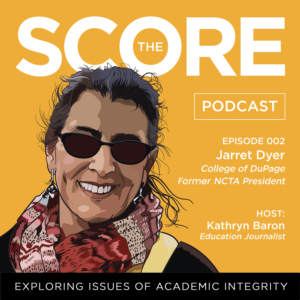EPISODE 002
The Score
Released
October 19, 2021

Jarret Dyer, former president of the National College Testing Association, test center administrator and co-chair of Academic Integrity at College of DuPage and a well-known, vocal expert on test administration, test security and academic integrity talks with The Score about who is most likely to cheat and how students feel about cheating. He shares an interesting story of how one student evaded a test proctor and says regarding research on cheating by students: “More than half the students admitted to cheating on tests.”
Show notes
Please contact us if you would like the full transcript.
On this episode of The Score, we’ll examine who cheats and what colleges and universities are doing about it, with Jarret Dyer. Jarret is a test center administrator at the College of DuPage, a former president at NCTA, that’s the National College Testing Association. He’s chair of multiple academic integrity committees, and co-investigator on several research projects. He frequently presents internationally on academic integrity and test security and is a self-described test security and academic integrity crusader.
Jarret Dyer (04:40):
From our own research we found that students in essence think [cheating is] conditional, it really depends on if the institution has provided them with the ability to cheat, their words, not mine, or if there were preventative measures to keep them from cheating.
Jarret Dyer (09:17):
We found that more than half of the students, so about 61% interviewed admitted to having cheating on tests. They do not do it very often and then generally do not think it’s acceptable, but here comes the but, but more than three quarters, so 75% do not consider all types of cheating that we presented them with as totally unacceptable. So, in other words, many students view academic integrity as conditional.
Jarret Dyer (10:32):
Students are more likely to think that cheating is acceptable, even expected if a test is given without a Proctor.
Jarret Dyer (10:56):
And what we’re finding, what previous research, prior to ours, really has shown is that there’s been a bit of a transition to an expectation for the institution to demonstrate the importance of why the action should not, why the cheating should not take place.
Kathryn Baron (13:16):
And it’s frightening actually. I mean, I wonder, should we be alarmed because you mentioned engineering and nursing. I really don’t want to go into a hospital and have a nurse who cheated working on me, it just seems a little bit scary.
Jarret Dyer (13:52):
But I have been at enough test security presentations by colleagues who usually start with a story of an individual who, I mean and terrifying stuff, an airplane crash, or a ship going off course or things of this nature, where it was shown that there had been either a large-scale cheating or particular cheating within a certain area. And you have to ask yourself, did one lead to the other? Was that pilot or that captain not capable of doing because of this?
Jarret Dyer (17:45):
And really from our research, what we found, that there’s a lot of rationalization and that students really, they think about the cheating behavior and they state, they tell themselves that if an instructor did not want us to cheat, they would not make it so easy for us to do so. So, placing the blame back on either the faculty or the institution for making it so easy. And what’s again, alarming is you had said about that is on the flip side, previous research has shown that faculty don’t believe that as much cheating is going on as students do. So, if you’re seeing a V-shaped perspective here with faculty thinking that there’s less cheating going on, and students thinking that the faculty are making it easier for them to achieve, then that proliferation goes unchecked.


 NEVER MISS AN EPISODE
NEVER MISS AN EPISODE